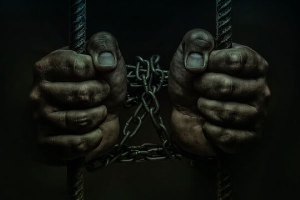The Makala prison in Kinshasa was the scene of an unprecedented tragedy at 2am on Monday, when 24 prisoners initially died in an escape attempt after they were shot by guards.
But the number had climbed to 129 by Tuesday morning. But one horror in the melee was that some women were sexually assaulted although officials did not give a number nor indicate whether the prisoners had a role in the violation.
Jacquemain Shabani Deputy Prime Minister for Interior and Security said the 24 who were shot defied orders to stop and return to the premises while dozens others died from ‘suffocation’ in a stampede that ensued.
Some 59 others were injured “and are currently being treated by the government for appropriate care,” he said.
In the DRC, however, prisons tend to be overcrowded which makes them a ticking time bomb for stampedes.
On this specific incident, the Deputy Prime Minister said a special commission has been set up to continue the investigations into what he called deplorable and “unfortunate incidents."
Yet even the figures of deaths were confusing. After the incident on Monday, the government said two people had died. Then videos of the dead started circulating on social media. There were more bodies than the figure given by the government.
Several buildings were burnt down, including the infirmary, the registry building and the administration building.
Like elsewhere in Africa, Makala is overcrowded. In the DRC, however, a sluggish justice system means more people also spend months, or years, waiting to have their cases concluded. Built for 1,500 prisoners, it currently holds almost 15,000 inmates.
The Deputy Minister of Justice, Samuel Mbemba, severely criticised the magistrates, whom he considered to be "the main culprits in the current crisis." In his view, prison overcrowding is exacerbated by the fact that ordinary suspects are sent to prison, whereas detention should be reserved solely for convicted prisoners.
"We want to say that the people primarily responsible for this are the magistrates who send even ordinary suspects to prison, against the principles of Congolese criminal law," said Mbemba.
In June this year, images published by journalist Stanis Bujakera, who was incarcerated in Makala for six months, caused a stir nationally and internationally, because of the poor conditions of the detainees. They were crammed together and sleeping on the floor.
Since then, Constant Mutamba, Minister for Justice, has committed himself to reducing overcrowding and improving conditions for prisoners in Kinshasa's main prison.
One former inmate who spoke to The EastAfrican said the overcrowding is not just a problem waiting for the world to see happen. It has a constant toil for inmates who have to endure congestion to serve their years.
“Let me say between two and seven people die every day in Makala prison,” the former inmate said.
In July this year, Mr Mutamba had more than 400 prisoners released to relieve the overcrowding at Makala prison. A few hours after the tragedy at Makala prison, Mutamba denounced what he called “an act of sabotage, a coup by the enemies of our people.”
He promised what he called an implacable response to those responsible.
One such move is a ban on the transfer of detainees to the Kinshasa penitentiary centre (Makala prison) by public prosecutors unless authorised by the Minister for Justice, as well as an intensified process of culling prisons, which could suggest more small-time criminals being freed to reduce overcrowding.
The events at Makala prison come at a time of growing tension between the Minister for Justice, who was only appointed in June this year, and the magistrates belonging to the Autonomous Union of Congolese Magistrates, their trade union. The latter are denouncing what they see as the Minister’s tendency to hold magistrates responsible for dysfunctions in the administration of justice.
Mutamba, for his part, insists on the need to undertake courageous reforms that must also affect magistrates.
Ever since President Tshisekedi deplored the "ailing justice system" in the DRC in February this year, Mutamba has been committed to remedying what he called an ailing justice system.
To achieve this, the Minister of Justice introduced a bill in the National Assembly to reform the justice sector, at the same time as launching "a fight against corruption, misappropriation of public funds and leakage of public revenue" by instituting a generalised process for the payment by bank transfer of all duties, taxes, fees, fines, sureties and consignment fees... and several other charges.
"I am carrying out the instructions of the Head of State, and things must be clear. We are going to fight the mafia networks to the bitter end", said Mutamba. In his fight to reform the justice sector, he said has no intention of backing down.
Mutamba was on Monday in Lomami province in central DRC attending some event. He said was extending the policy of decongesting prisons with a view to improving prison conditions. But his office in Kinshasa was also broken into by some unknown people.
In a press release, the Minister said there will be an investigation into the “the work of negative and mafia-like forces that feel threatened in the fight to clean up the justice system in our country.”
Click to view details



Africa News of Wednesday, 4 September 2024
Source: theeastafrican.co.ke
Prison break deaths reveal congestion problem in Congolese jails
 At least 129 people were killed while trying to escape from the central Makala prison in the capital
At least 129 people were killed while trying to escape from the central Makala prison in the capital
















